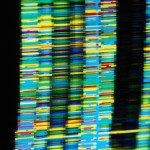Lien vers Pubmed [PMID] – 11559564
Cancer Res. 2001 Sep;61(18):6876-84
Specific phosphorylation of serine- and arginine-rich pre-mRNA splicing factors (SR proteins) is one of the key determinants regulating splicing events. Several kinases involved in SR protein phosphorylation have been identified and characterized, among which human DNA topoisomerase I is known to have DNA-relaxing activity. In this study, we have investigated the mechanism of splicing inhibition by a glycosylated indolocarbazole derivative (NB-506), a potent inhibitor of both kinase and relaxing activities of topoisomerase I. NB-506 completely inhibits the capacity of topoisomerase I to phosphorylate, in vitro, the human splicing factor 2/alternative splicing factor (SF2/ASF). This inhibition is specific, because NB-506 does not demonstrate activity against other kinases known to phosphorylate SF2/ASF such as SR protein kinase 1 and cdc2 kinase. Importantly, HeLa nuclear extracts competent in splicing but not splicing-deficient cytoplasmic S100 extracts treated with the drug fail to phosphorylate SF2/ASF and to support splicing of pre-mRNA substrates containing SF2/ASF-target sequences. Native gel analysis of splicing complexes revealed that the drug affects the formation of the spliceosome, a dynamic ribonucleoprotein structure where splicing takes place. In the presence of the drug, neither pre-spliceosome nor spliceosome is formed, demonstrating that splicing inhibition occurs at early steps of spliceosome assembly. Splicing inhibition can be relieved by adding phosphorylated SF2/ASF, showing that extracts treated with NB-506 lack a phosphorylating activity required for splicing. Moreover, NB-506 has a cytotoxic effect on murine P388 leukemia cells but not on P388CPT5 camptothecin-resistant cells that carry two point mutations in conserved regions of topoisomerase I gene (Gly361Val and Asp709Tyr). After drug treatment, P388 cells accumulated hypophosphorylated forms of SR proteins and polyadenylated RNA in the nucleus. In contrast, neither SR protein phosphorylation nor polyadenylated mRNA distribution was affected in P388 CPT5-treated cells. Consistently, NB506 treatment altered the mRNA levels and/or splicing pattern of several tested genes (Bcl-X, CD 44, SC35, and Sty) in P388 cells but not in P388 CPT5 cells. The study shows for the first time that indolocarbazole drugs targeting topoisomerase I can affect gene expression by modulating pre-mRNA splicing through inhibition of SR proteins phosphorylation.

